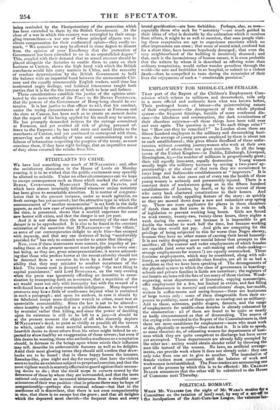EMPLOYMENT FOR, MIDDLE-CLASS FEMALES.
THAT part of the Report of the Children's Employment Com- mission which relates to milliners and dressmakers, tells only in a more official and authentic form what was known before, Their prolonged hours of labour—the unintermitting nature of their employment—the derangement of the whole physical system—the frequent fain tinge, heralds of more confirmed dis- ease—the blindness and consumption, the dark terminations of their cheerless existence—all these things have been told over and over again. The question is not "Do such things exist ?" but "How can they be remedied?" In London alone there are fifteen hundred employers in the millinery and dressmaking busi- ness; the average of young persons employed by them is about ten to each establishment ; this gives fifteen thoulland of these unfor- tunates, without counting journeywomen who work at their own houses, and of whom there are great numbers. In all the large towns of the United Kingdom—in Dublin, Edinburgh, Liverpool, Birmingham, &c.—the number of milliners is proportionally great; their toil equally incessant, equally destructive. Young women usually begin the millinery business by serving a two-years' ap- prenticeship; at the close of that term they are accustomed to enter large and fashionable establishments as " improvers." It is estimated, that in nine cases out of every ten the health of these young women is seriously and permanently injured. There is a constant drain of workwomen going on in the fifteen hundred establishments of London, by death, or by the retreat of those who carry back shattered constitutions to their homes. And now comes the really appalling feature of the story : as quickly as they are mowed down does a new and redundant crop spring up. There are more applicants for places in these chambers of death than can find room in them. It is in vain to talk of legislation to prevent working long hours. Girls are forced to work twenty, twenty-two, twenty-three hours, three nights a week during the season ; not because it is impossible to get double the number to work half the time, but because working half the time would not pay. And girls are competing for the privilege of being subjected to this far worse than Negro slavery, because they have no other means of earning their bread honestly. It is not vanity despising more menial labour that prompts to the sacrifice; all the coarser and ruder employments of which females are capable (and some such as nail-making and chain-making- strange employments for women !) are equally overstocked. These feminine employments, which may be considered, along with mil- linery, as appropriate to middle-class females, are all in as bad a condition as that we have been speaking of The derangements of the physical system to which the class of governesses in boarding- schools and private families is liable are notorious; the registers of our lunatic asylums tell the fate of too many of these victims. Wood- engraving, some departments of literature, copying manuscripts, offer employment for a few, but limited in extent, and fast filling up. Saleswomen in mercers' and confectioners' shops, bar-maids, waiters in coffee-rooms and eating-houses—these are businesses of large towns only : some of them disagreeable from their ex- posure to publicity, most of them quite as wearing-out as millinery. Add to these, actresses, public singers, dancers, and the range of employments for middle-class females is already exhausted by the enumeration : ail of them are found to be quite or nearly as badly circumstanced as that of dressmaking. The source of the crying evils revealed in the Report of the Commissioners is, that there are more candidates for employment—more who must work or die, physically or morally—than can find it. It is idle to speak, as some theorists do, of educating women for departments of busi- ness which they are quite competent to discharge but have never yet attempted. These departments are already fully occupied by the other sex: .society would obtain slender relief by throwing the men idle instead of the women. No laws, no artificial arrange- ments, can provide work where it does not already exist : they can only take from one set to give to another. The immolation of female victims must continue, until the balance of work and workwomen is reestablished. The Free-traders are announcing one part of the process by which this is to be effected: Mr. CHARLES BUZZER announces that the other will be submitted to the House of Commons next Thursday.


























 Previous page
Previous page